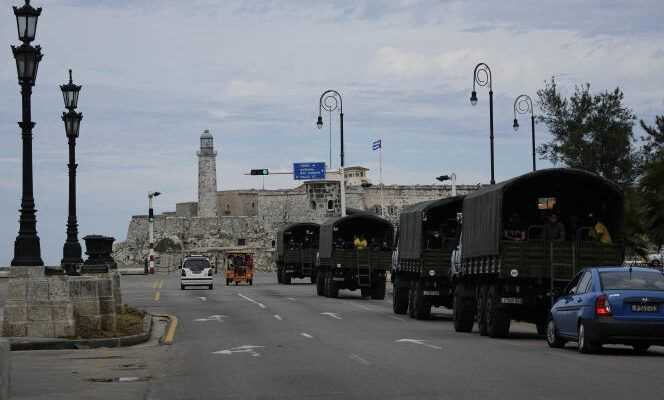The police presence and the arrest of leaders of Cuban dissidence prevented them from carrying out, Monday, November 15, their demonstration, banned by the authorities, who mocked a “Failed operation” of the United States, which denounced a maneuver to “Silence” protesters.
On social networks, some Cubans posted photos of themselves, dressed in white as the order said, but the planned big demonstration did not take place, with many police officers in uniform and in civilian clothes in the streets. of Havana.
Foreign Minister Bruno Rodriguez mocked a “Failed operation” of the United States to destabilize Cuba through this demonstration for the release of political prisoners. “Apparently some of my colleagues in Washington dressed for nothing, for their party which did not take place”, he mocked in a video posted via Facebook.
The White House reacted by denouncing the Cuban government’s maneuvers to “Silence” peaceful demonstrators, including arrests of opponents who were to meet in Havana and six provinces.
“Ahead of the peaceful protests planned for today, the Cuban government has resorted to prison terms, sporadic arrests, and intimidation techniques (…) in its attempt to silence the voice of the Cuban people ”, lamented White House National Security Advisor Jake Sullivan. “The United States pledges to support the actions of Cubans who seek to promote democratic change”, he continued, calling on the Cuban government not to use violence against dissidents.
“Campaign against Cuba”
The call to protest coincided with the island’s reopening to tourism and the return of students to school after months of closure due to the Covid-19 pandemic. President Miguel Diaz-Canel, who attended the start of the school year in western Havana, denounced on Sunday a desire to “Disturb the internal order” and an “Media campaign against Cuba”.
The authorities had banned the demonstration and threatened the organizers – the Facebook political debate group Archipiélago, which has 37,000 members in Cuba and abroad – with criminal sanctions.
On Monday, several dissidence leaders were arrested including Manuel Cuesta Morua, vice-president of the Council for the Democratic Transition. The leader of the Ladies in White movement, Berta Soler, and her husband, ex-political prisoner Angel Moya, were also arrested. Art historian and activist Carolina Barrero, prevented from leaving her home for two hundred days, has also been arrested, the dissident movement 27N, of which she is a member, said. Another opposition figure, Guillermo Fariñas, has been in detention since Friday.
Many dissidents, protest promoters and independent journalists said they were blocked in their homes by the police. Several of them said they had been subjected to acts of repudiation – these gatherings of residents used for decades to curse dissidents – or having the Internet cut off.
Economic crisis
“If they don’t let me go out today, I will do it tomorrow, even more convinced and determined”, promised via Twitter Saily Gonzalez, who called for demonstrations in Santa Clara (center) but could not leave her home.
The playwright Yunior Garcia, 39, founder of Archipiélago and spearhead of a new generation of dissidents stimulated by the rise of social networks, was also prevented from leaving his home on Monday by plainclothes agents, noted a journalist from Agence France-Presse. The day before, his plan to march alone, a white rose in his hand, had been stopped by the presence of the police around his building.
The call to protest came four months after the spontaneous and historic protests of July 11, which left one dead and dozens injured. Of the 1,270 people arrested, 658 remain imprisoned, according to the NGO Cubalex, Cuban independent media citing the required sentences of up to thirty years in prison.
The country is experiencing its worst economic crisis in nearly thirty years, with severe shortages of food and medicine. Social discontent is growing and confrontation is at its height between defenders and critics of the government.
On Monday, France asked the government to “Guarantee the right of the Cuban people to assemble and demonstrate peacefully”. The day before, US Secretary of State Antony Blinken had called him “To respect the rights of Cubans, letting them come together in a peaceful manner”. For his part, Mexican President Andrés Manuel Lopez Obrador expressed his admiration for the” arrogance “ from Cuba, country “Free and independent”.
